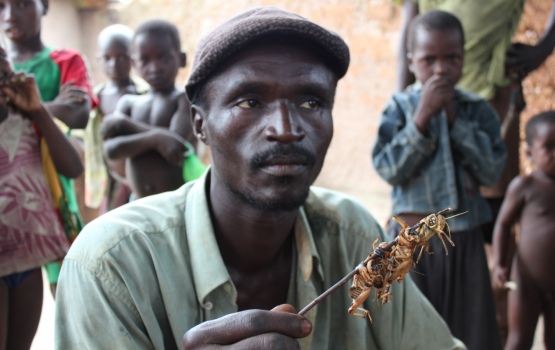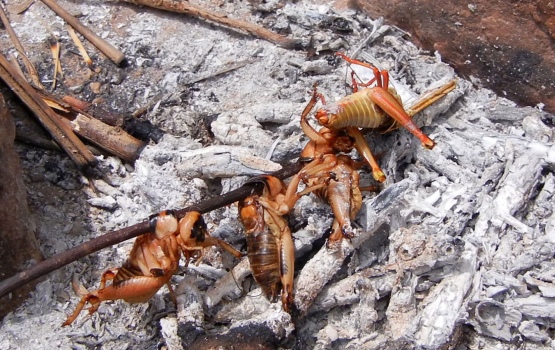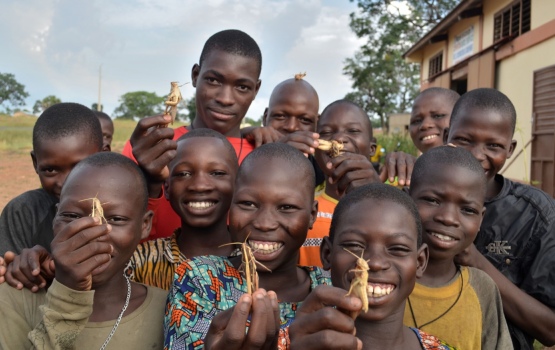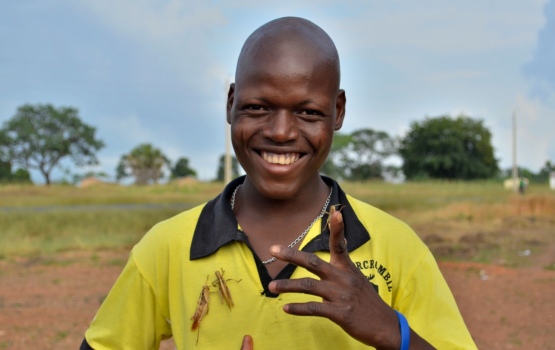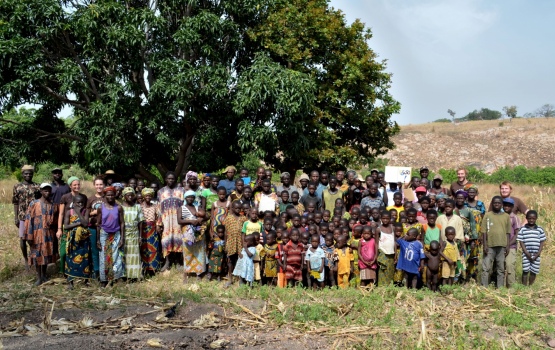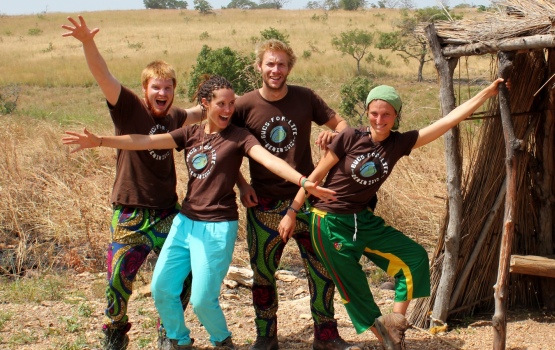Gastro grub on the menu for Imperial explorers

A local delicacy
A team led by Imperial students return from Benin, where they have been sampling the local bug life.
Eating cricket kebabs, collecting bugs with local villagers, and extending our knowledge of insect eating practices in Benin were all on the menu for a two-month expedition led by two Imperial students before Christmas.
Rudi Verspoor and Laura Riggi from the Department of Life Sciences were joined by Mariangela Veronesi, a master’s student from UCL, and Craig MacFarlane, an experienced science communicator, on their exploration of the entomophagy – the use of insects as a food source, in the villages of North Benin.
While entomophagy might cause some to shudder it could also inform approaches to ensuring food security in the future, as Rudi explained: “Entomophagy could offer an environmentally friendly, highly efficient source of protein, as well as avoiding some of the disease risks associated with eating farmyard animals.”
Benin was chosen because entomophagy in parts of Africa, unlike in countries in South-East Asia, has not developed into large scale industry. Benin in particular, despite having a number of groups which traditionally eat insects, has little in terms of an economy surrounding the collecting and selling of insects.
The students’ research goal was to create an inventory of the insects traditionally eaten by the Wama people, and to document and film how the insects were collected, prepared, cooked, and by whom they were eaten. The inventory has almost doubled the number of insect species known to be eaten in Benin as well as revealing a species of insect, eaten by the Wama, which had not been recorded in Benin before.
It was great to learn more not only about insects and how they fit into the Wama people’s lifestyles and traditions, but also about their environment and their culture in a wider sense. Eating insects after collecting them was also quite fun!
– Rudi Verspoor
Having arrived in Benin’s capital, Cotonou, the students met with scientists from the University of Abomey-Calavi and researchers at the International Institute for Tropical Agriculture (IITA), before heading to the town of Tanguieta in the north-west of the country. A particularly memorable moment for Rudi was the first insect collection in the village of Kosso. Although the students had already met with the delegate of the village, this was the first time they had interacted with the rest of the community. Rudi said:
“I think there was a lot of curiosity and excitement on both sides: it was great to learn more not only about insects and how they fit into the Wama people’s lifestyles and traditions, but also about their environment and their culture in a wider sense. Eating insects after collecting them was also quite fun – we finally got to experience what we came for!”
Although they came across some insects that might not make it onto the menu at your local restaurant, such as the armoured ground cricket with its huge squishy abdomen and heavily armoured head, the team discovered some culinary delicacies that they intend to serve up at home. Rudi’s favourite recipe was for mole cricket kebabs, roasted over hot charcoal, prepared by removing parts of the insect such as wing cases and hind feet, before they are grilled.
During their research the students also uncovered certain trends around insect eating practices, finding that it was predominantly the children who collected and ate the insects, the same group who also suffer most from acute and chronic malnutrition. They also learned more about future food options, such as integrating insect flour into porridge-like meals given to malnourished children in hospitals.
In planning and coordinating the expedition, the students were advised and supported by the College’s Exploration Board, which draws on the international fieldwork experiences of members of Imperial. They were also supported by the Royal Entomological Society and internet donors.
Beyond the research, spending two months together in a completely new country while trying to achieve their project goals has given the group a long term bond between themeselves and with the communities they met. Rudi added, “for us the real eye opener was how happy, friendly and helpful the people we worked with are.”
Having returned to the relatively mundane culinary life of the UK, they each plan to maintain their entomological connections, with Rudi pursuing a PhD in Evolutionary Biology and Laura seeking work or further study in pest management. One thing they all intend to do is continue eating insects – although ordering online remains slightly more expensive than collecting them on the ground in Africa!
Article text (excluding photos or graphics) © Imperial College London.
Photos and graphics subject to third party copyright used with permission or © Imperial College London.
Reporter
Anthony Wilkinson
Office of the Provost

